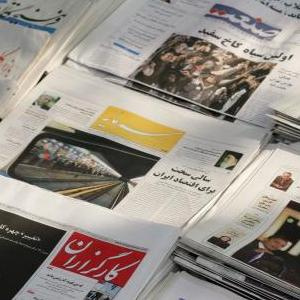Tehran's Daily Newspaper Review

Top of the news in Tehran's dailies was Supreme Leader Ayatollah Khamenei’s statement in his meeting with Iranian nuclear scientists and Atomic Energy Organization operatives, where he promised that Iran will “crush” –read ‘invalidate’- the mentality that nuclear weapons lead to power. Ayatollah Khamenei accounted the sense of national pride and dignity brought to Iranians as the key achievement of Iran's nuclear program, adding that the Iranians have never sought nuclear weapons and will never do so.
While the hardliner weekly Lasarat –once an ardent supporter of Ahmadinejad- has slammed Ahmadinejad's administration for “disgracing” economic figures, the government’s mouthpiece Iran chose “unemployment reined in” as its top headline. The newspaper quoted the Statistical Center of Iran that the unemployment rate of the Persian year 1390 [March 21 2011- March 21 2012] will be definitely lower than the previous year. The front page also featured a report chiding parliamentary elections candidates for making promises to their constituencies that do not even fall within their jurisdiction and merely add to the government’s burden.
Discovery of six new oil and gas fields, the skyrocketing price of fuel in France, UK and the US after Iran's preemptive halt on oil sales to European countries, anti-government protests in Italy, Spain and Greece, and the seizure of 120 French military troops in the Zabadani region in northwest of Damascus appeared on Kayhan’s front page. In its review of one decade of nuclear standoff between Iran and the West, Kayhan argued that “trading fear” has been the key feature defining the struggle between Iran and the West, with both parties following one basic rule: wielding their power and intimidating the rival. The legal dimension of the nuclear saga is quite insignificant, the editorial argued, and it is a likely shift in the power balance in the Middle East with Iran's nuclearization that the Western countries are truly worried about.
Shargh reported of Hashemi Rafsanjani’s meeting with the Coordination Council of the Reformist Front --the umbrella organization comprised of 18 Reformist parties and groups. Deeply worried with Iran's state of affairs, the 73-year old ayatollah advised détente and shoring up relations with the international community, and engaging citizens’ participation in running the country. “Some are trying to disorient the public about the financial corruption” involving a 2.6 billion dollar scam, Shargh quoted Chief Magistrate Sadeq Larijani. “The tragedy of democracy in Yemen”, the newspaper’s editorial authored by Hassan Hanizadeh, expressed sorrow over the mock single-candidate presidential elections which presented Ali Abdullah Saleh’s deputy, Abd-Rabbu Mansour Hadi, with the presidential portfolio, and criticized Riyadh for thwarting pro-democracy efforts in Yemen.
* Notes:
The editorial section of Iranian newspapers is not the work of the editor-in-chief or the senior editorial staff of the newspaper by default, but can be a contribution by experts and politicians (typically agreeing with the newspaper’s political stance.) The newspapers may also occasionally publish without an editorial.
Vatan-e Emrooz daily does not publish on Thursdays.
Trouble with understanding some terms? Check our Glossary of Iranian Political Terms.
Briefing
Iran is the official organ of the administration. Its current editor-in-chief is Ali-Akbar Javanfekr, former media advisor to President Mahmoud Ahmadinejad.
Jomhouri-ye Eslami (The Islamic Republic) was known as the official organ of the Party of the Islamic Republic, founded in 1979 and disbanded in 1987. Currently, it is an open critic of Mahmoud Ahmadinejad's policies and is known to be a mouthpiece of Akbar Hashemi Rafsanjani.
Kayhan (Universe) is a hard-line conservative newspaper. Its editor-in-chief –currently Hossein Shari’atmadari- is directly appointed by Iran's Supreme Leader. Shari’atmadari’s editorials often spark off controversy and debate inside Iranian political circles.
Resalat (Mission) belongs to the moderate wing of the Principlist camp. Resalat’s best known analyst is Amir Mohebbian, its political editor.
Shargh (East) is a moderate Reformist newspaper. It was the most popular and influential Reformist newspaper in its first period of publication which lasted from August 2003 until September 2006.
Tehran-e Emrooz (Tehran Today) is a “Principlist/Reformist” newspaper, connected to Mohammad Baqer Qalibaf, Tehran Mayor and a likely candidate of the 2013 presidential election.

